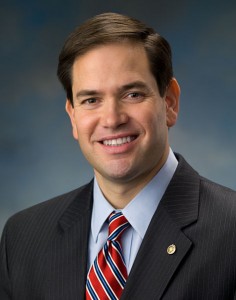Marco Rubio’s Immigration Stance Alienates Latino Voters
 By Albert Morales, President of Albert Morales Strategies, LLC
By Albert Morales, President of Albert Morales Strategies, LLC
To witness the meteoric rise of Senator Marco Rubio, one can’t help but cheer his ascension in the ranks of the Senate. His rise from the Florida State Legislature to the United States Senate is no small feat. To borrow a quote from President Obama, “Only in America is his story possible.” Like many of us, the son of Cuban immigrants has lived the American Dream thanks to the hard work of his parents and his laser-like focus. Beyond a Latino inspiration of the American Dream, the same intensity to succeed that thrust Rubio to higher office can also be the cause of his downfall when it comes to wedge issue politics.
Rubio’s Senate campaign is our first glimpse of his ability to walk the knife’s edge between Tea Party conservatives and moderate Latino voters. Rubio’s campaign managed to navigate the polluted waters of Florida’s Tea Party movement while keeping moderate and Latino voters on the boat. As the reality show drama of the Republican primary unfolds and front-runners come and go, those keeping their eye on the 2012 election know that Latino voters will be key in determining who is our next president.
Marco Rubio might be the linchpin.
Now settling into his Senate career, Rubio is literally and figuratively identifying with the Tea Party brand of conservatism that has defined the current gridlocked Congress. He is often found huddling with his mentor, South Carolina Senator Jim DeMint, an enemy of the Latino community who favors mass deportation as a solution to our immigration quagmire. Just last week, Senator Rubio’s staff welcomed a meeting with famed Birther Queen, Orly Taitz, whose bigoted attacks on the President and immigrant community are relentless.
I’m still trying to determine what Rubio is doing to ensure that moderates are kept within the fold. Despite his successes in blocking anti-immigrant legislation in the Florida legislature, Rubio has instead reversed his position on immigration and has regrettably chosen to become an anti-immigrant crusader in the Senate. He has been opposed to even debating the merits of the DREAM Act. I fear that Rubio’s intense focus on success is driving his about face on comprehensive immigration reform and the DREAM Act.
As distasteful as it seems, employing wedge politics is a successful strategy. Latino evangelicals are increasingly alienated by the Democratic Party’s positions on the issues of gay rights, abortion and charter schools to name a few. While Rubio stands to gain from exploiting wedge politics on these issues within the Latino electoral base, it is unclear how his opposition to the DREAM Act balances this.
Rubio’s current immigration stance doesn’t necessarily work on the national stage, either. Maybe he can justify his pro-Cuban immigration stance with Tea Party conservatives by explaining that amnesty for Cubans is justified because Cuba is a Communist country. While that may play for Tea Party conservatives, I don’t see it playing for other non-Cuban Latino voters. The last time I checked, kidnappings and beheadings weren’t commonplace in Cuba; today it is safer to walk the streets of Baghdad and dare I say Habana, than some major cities within Mexico, yet amnesty is rarely granted to those seeking asylum. Rubio has chosen to tell Colombians, Salvadorans, Mexicans, Hondurans and other Latinos they are not welcome in America unless they choose to wait in line for over 10 years.
Republicans party strategists can taste victory and see Rubio as key to achieving a win in 2012. Defining Rubio now is a must if Democrats want to remain competitive among Latino voters. Either he favors amnesty or he doesn’t. Letting him dance on a wet-foot/dry-foot agenda might work for Tea Party conservatives, but it doesn’t work for non-Cuban Latinos.
Albert Morales is the President of Albert Morales Strategies, a government relations and communications firm. Morales has over a decade of experience working with the Democratic National Committee and was responsible for the Latino outreach strategy in the lead up to the 2008 Democratic Party Presidential Primary under the leadership of Governor Howard Dean through the 50-State Strategy.
[Photo By U.S. Senate]
